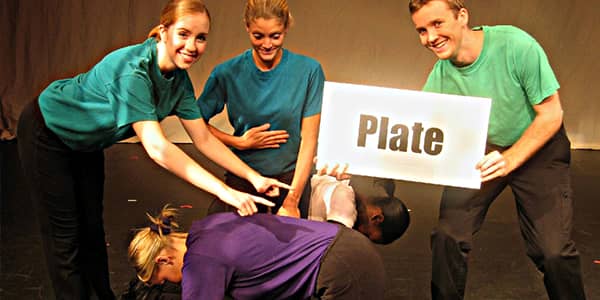Blog

Meet Our Artists: Quest Visual Theatre

Young Audiences’ roster of artists continues to grow to encompass new artists, ensembles, and art forms, from slam poets to improvisers to Capoeira masters.
We’ll be regularly posting interviews with our artists, giving them a chance to share more about themselves and their experiences bringing their Young Audiences programs to schools. We recently sat down with Tim McCarthy of Quest Visual Theatre.
Why did you decide to become a Young Audiences roster ensemble and how does it align with Quest Visual Theatre’s larger mission?
I had known several artists in Maryland who were with Young Audiences and I began to investigate what the organization was about. It made me think about where Quest Visual Theatre was heading and I thought it was something worth pursuing because we have so much experience working with children.
We are an inclusive company. Deaf people are a part of everything we do everyday and we wish to celebrate the people who are in this world. That’s the world we want to live in and we wish to bring those experiences it into children’s lives.
Quest also uses visual theatre to cut across language and cultural barriers. All of our work is inclusive and accessible. Everything that Quest does reflects the company’s commitment to welcoming to all people. One program that reflects that is QuestFest, which is a biennial international visual theatre festival. Quest partners with area theaters, universities, and agencies to present performances, conduct approximately 20 residencies, and provide training in visual theatre. The QuestFest Community Showcase enables students who have participated in QuestFest residencies to share work that they created.
What has been the most memorable part of the programs you have brought to the students with Young Audiences?
I love what I’m bringing into the schools and seeing how engaged the students are. Quest does little warm-ups before each performance. We play a game like charades with the audience. We have the audience begin to guess what the actors are doing; playing baseball, football, or golf. That really gets the kids involved and excited.
Do you have a memory of when you felt that you has an impact upon a student or class?
Students usually don’t know how to approach our actors because they are deaf, but after a performance or residency, we intentionally spend time and stick around to interact with the children. That’s when the hugs begin to happen. Things really change at that point. They see our artists as people they want to interact with. The communication barrier goes away.

How does your art form help connect students to what they are learning in school ?
Our goal is to integrate theatre into the curriculum. We do this by focusing upon two primary areas, including learning readiness and literacy.
How do the lessons that you teach students apply to and affect their everyday lives outside of the classroom?
In addition to learning the art form, the developmental skills we are focus on are communication and interpersonal skills. When you’re creating something and working in collaboration with others, especially if you’re not able to speak, you’re going to have to be clear about what your intentions are. Our lessons teach children how to send and receive information clearly with engagement.
Learn more about Quest Visual Theatre‘s offerings through Young Audiences.








